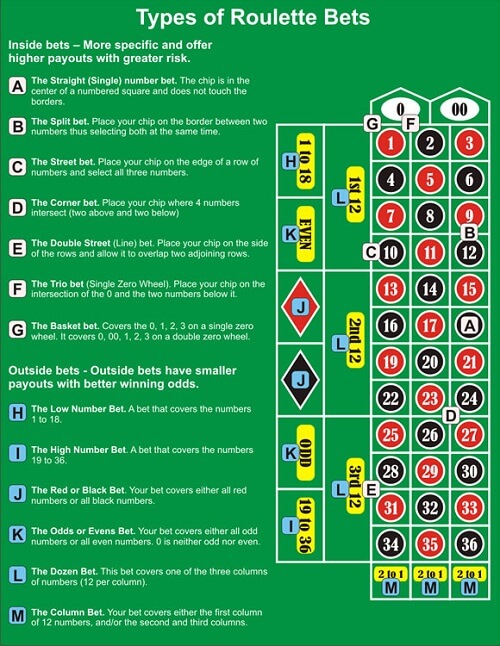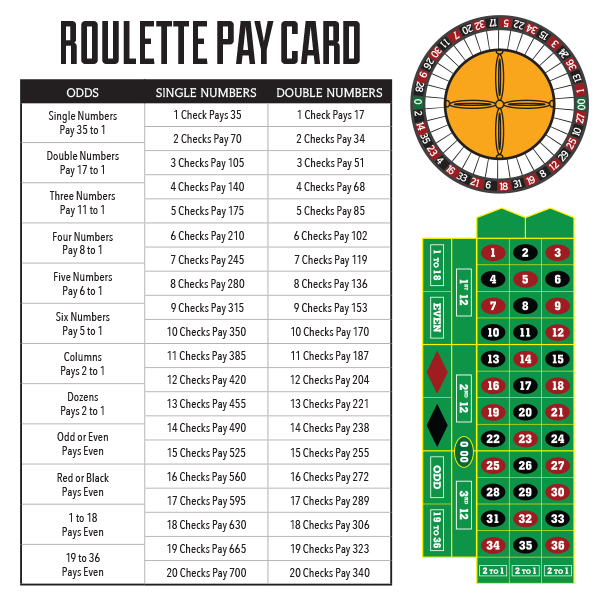Roulette Odds Chart
The roulette odds calculator is also referred to as the roulette odds chart. A less popular name for it is the roulette payouts chart. Players can use the roulette odds chart to determine how much they could possibly win when the ball lands on the bet wagered. The chart uses the x to 1 form which means you win x dollars for every $1. Roulette payouts and odds vary from one type of wheel to another. The American roulette payout chart is based on both single and double 0 pockets. The European payout charts are based on a wheel with only a single green 0. The type of bet determines the risk and subsequent odds.
For the most part, calculating roulette payouts is just a matter of multiplication. Each bet pays out at certain odds, and that determines what you multiply the bet by to get the payout. Also, as with most table games, the payouts are done on an X to Y basis, as opposed to an X for Y basis.
This post wants to cover roulette payouts in some degree of detail, though, including how much each bet pays off.
More importantly, I want to explain how the croupier is able to calculate payouts for roulette so quickly. Guess what? They have a system for that.
Payout Odds in Gambling
When you’re gambling on something, you get paid off using odds. Some games offer even odds, which means that if you bet $100, you win $100 when you win.
Most games, though, have various payouts for various kinds of bets.
The top jackpot on a video poker machine pays off at 800 for 1.
And that’s an important distinction. There’s a big difference between a payoff of 800 for 1 and a payoff of 800 to 1.
With table games like roulette, the payoffs are in the form of 2 to 1, 3 to 1, 35 to 1, etc.
This means that if you win the bet, you get to keep the amount you bet, and you get the winnings along with it.
If you bet $100 on a single number at the roulette table and win, you get a payoff of $3,500. But you also get to keep your $100.
With gambling machines, payouts are made on a “for” basis instead of a “to” basis. This means your winnings are traded for what you risked.
If you bet $5 on a slot machine and win a $10 payout, you don’t get your $5 back on top of that.
This is an important distinction you should make. Most gamblers don’t stick just with roulette, so if you’re going to play other games — and you probably will — you should understand how that works.
Specific Payouts in the Game of Roulette
In roulette, you have a huge variety of bets you can place. You bet on a single number. Or you can bet on two numbers — if either of those numbers come up, you win. Or you can bet on three numbers, and if any of those three numbers come up, you win.
Probability Of Winning The Roulette American Wheel
The more likely it is for you to win, the lower the payout is.
A bet on black wins almost half the time. The payoff for that bet is only 1 to 1, or even money.
A bet on a single number pays off at 35 to 1, which is a big payoff, but it also only wins 1 out of every 38 spins on average.

The Difference Between the Odds of Winning and the Payout Odds
The casino makes its money from the difference between the odds of winning and the payout odds.
You know how you can express the payout on a bet as odds?
35 to 1 is an example of how you’d express a payoff on the single number bet.
The odds of winning can also be expressed in the same way.

On a standard American roulette wheel, you have 37 ways to lose a single number bet and only one way to win.
This means the odds of winning are 37 to 1.
Since the odds of winning are lower than the payoff for the bet, the casino makes a profit in the long run.
Once out of every 38 spins, they’ll pay off a single number bet, but they’ll only pay off 35 to 1 on that bet. The rest of the money goes into the casino’s pocket.
The casino deals in long-term averages, especially when it comes to roulette.
Roulette Bets and Their Payoffs
Here’s a list of bets you can make at the roulette table and how much each of them pays off.
The Outside Bets
These are the bets on the outside of the betting surface, and they’re the bets that pay off the most often. As a result, you win less with these bets.
Here are the outside bets you can make:
- Red(or Black) – You can bet on the color of the number, and the payout is even money — 1 to 1
- Even (or Odd) – You can bet that the number will be even or odd, and the payout is again even money — 1 to 1
- Low (or High) – You can bet that the number will be 1-18 (low) or 19-36 (high). The payout is even money on this one, too
- Columns – The numbers on the betting surface are organized into three columns. You can bet that the ball will land on one of the numbers in that column. The payoff, if you guess right, is 2 to 1
- Dozens – The numbers can be divided into 1st third (1-12), 2nd third (13-24), and 3rd third (25-36). If you guess right, you get a 2 to 1 payout
On all these outside bets, 0 and 00 count as losses. Those numbers are green, and they’re not considered even or odd, high or low.
The Inside Bets
These are the bets on the inside of the betting surface. They pay out better but have a bigger chance of losing.
Here are the inside bets you can make:
- Straight Up – This is a bet on a single number and pays off at 35 to 1
- Split – This is a bet on two numbers that are next to each other. It pays off at 17 to 1
- Street – This is a bet on three numbers, and it pays off at 11 to 1
- Corners – This is a bet on four numbers, and it pays off at 8 to 1
- The 5-Number Bet – You can only bet on 0, 00, 1, 2, and 3 if you want to bet on five numbers, and it pays off at 6 to 1. This is the only bet on the roulette table with a different house edge from the other bets — 7.89% (the other bets have a house edge of 5.26%)
- Line – This is a bet on six numbers and pays off at 5 to 1
All these bets would be a break-even proposition in the long run IF the wheel didn’t have a green 0 and a green 00.
How the Croupier Makes the Payouts So Quickly
The first thing the croupier does after the decision is to clear all the losing bets off the roulette table. Since he’s intimately familiar with the layout of the betting surface, this doesn’t take long at all.
Also, all the players at the roulette table have chips that are specifically colored so that they have the same color. You can’t use the roulette chips at the other table. This enables the croupier to tell your bet from someone else’s. It’s the color of the chips.
Blackjack Odds Chart Bet
To calculate the payouts, you just multiply the bet by the payout odds.
If someone bet two chips on a single number and it won, you’d multiply 2 by 35 and get 70. That’s how many chips you’d give the player in winnings.
He doesn’t really have a magical system, either. He knows the payouts for the various bets, and he’s able to do the multiplication in his head. It’s easy multiplication, but even if it weren’t, he’d eventually just be able to memorize the correct payout relative to the number of chips bet.
Also, he doesn’t really think of the chips as money. They’re just betting units.
Can Any of This Information Help Me Win at Roulette?
Naw.
Roulette’s a negative expectation game.
You might get lucky in the short run, but if you play long enough, the math behind the payouts will eventually reduce your bankroll to 0.
Conclusion
And that’s how to calculate roulette payouts. You just memorize which bets are possible and how much they pay off. Once you know that, calculating the payouts is just a matter of multiplication.
Croupiers are able to do it quickly because they do it all day every day.
I’m able to make change in my head because I worked for years on cash registers that didn’t calculate change. I know how to subtract from 100 without any effort at all.
Calculating roulette payouts is a similar skill.
Roulette Odd Wins Pay
Please enable JavaScript to view the comments powered by Disqus.Odds for Single Zero & Double Zero Roulette
The most important part of any Roulette strategy is knowing the difference between a single and double zero wheel. New players do not realize how this absence or presence of another zero can change the odds.
The early version of Rolette featured only a single zero, and it is still used in European casinos today. However when the game was shipped to the United States, the casino operators decided to add another zero to increase the Roulette odds in favor of the house. There are some single zero wheel in American casinos, but usage is limited to high rollers.
The Roulette odds for the single zero wheel would then be 2.63% (1 out of 37). For double zero it would be 2.70% (1 out of 38). But the odds for the other bets and wagers are affected as well. The following are the bets, payouts, and the Roulette odds for the single zero and double zero wheels.
Roulette Odds for Single Zero Roulette Wheels
For wagers on red, black, odd, even 1 to 19, and 19 to 36 the payouts are 1 is to 1, and the probability is 48.65%. For wagers on 1 to 12, 13 to 24, and 25 to 36, the payout is 2 to 1, with a probability of 32.43%.
For a single number it is 2.70%, for two numbers 5.40%, three numbers it is 8.11%; for a four number bet it is 10.8%, and six numbers 16.22%.
Roulette Odds for Double Zero Roulette Wheels
The Roulette payout is 1 to 1, with a probability of 47.37% for the following wagers: Even, odd, black, red, 1 to 18 and 19 to 36. For 1 to 12, 13 to 24 and 25 to 36 the edge is 31.58% with a 2:1 payout.
For one number the payout is 35:1 with a house edge of 2.63%; with two numbers (17:1 5.26%), three numbers (11:1, 7.89%), for four number bets the payout is 8 to 1 with an edge of 10.53%. For six numbers the payout will be 5:1 with an edge of 15.79%. The five number bet pays 6:1 (13.16%).
The Roulette odds, as can be seen, chang considerably with respect to the single and double zero wheel. With a knowledge of the odds, you will be able to make the necessary wagers and adjust your strategies as needed.
It is recommended that you should play with single zero wheels, but even if they are not available, your knowledge about the odds for the double zero wheels will allow for more intelligent betting.